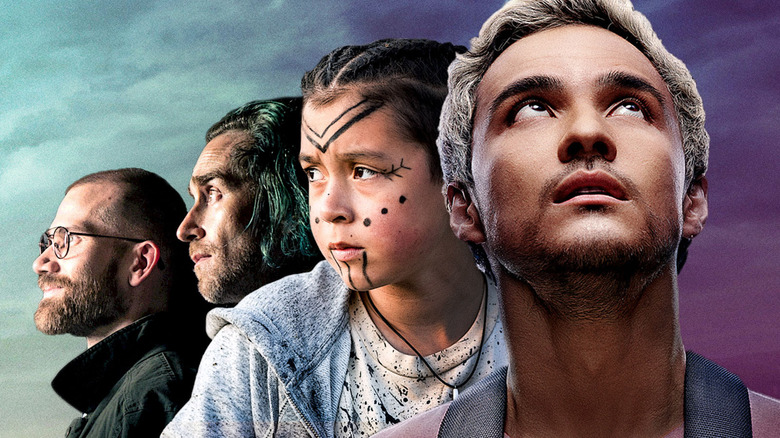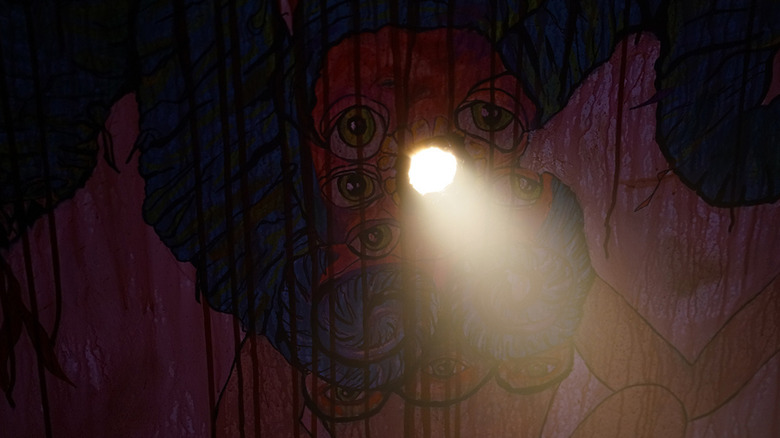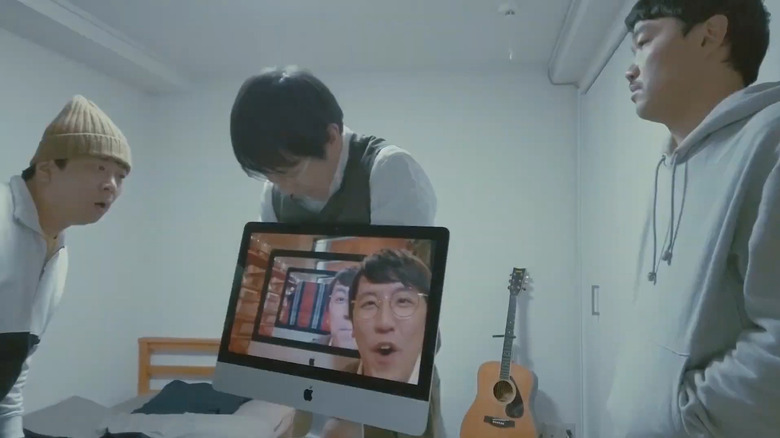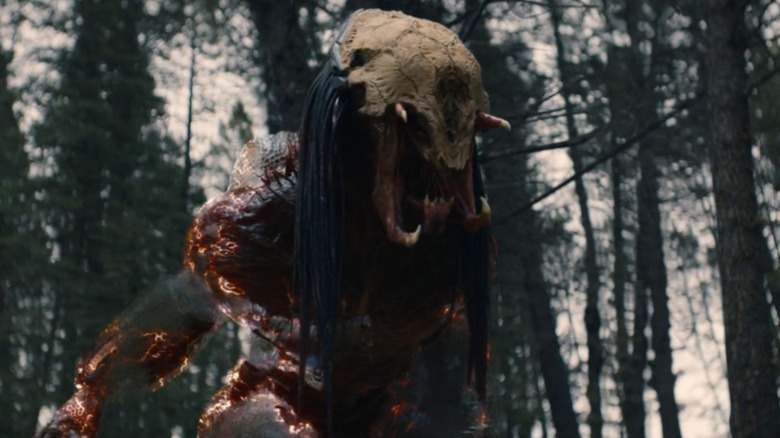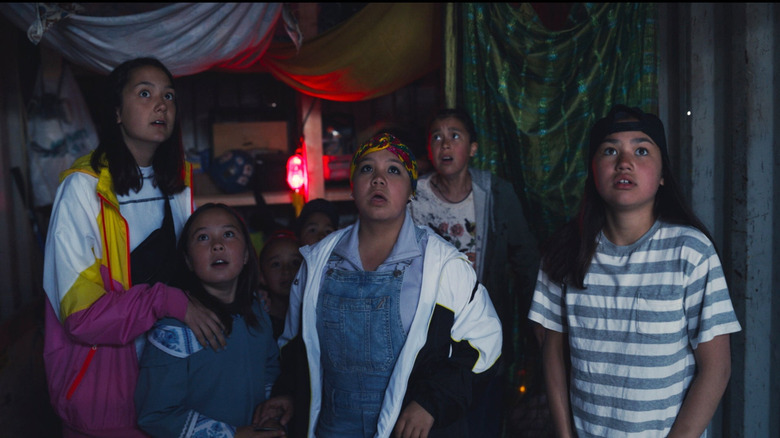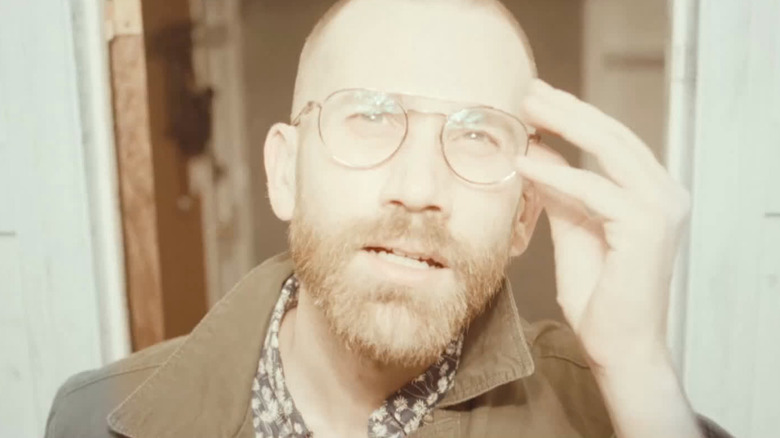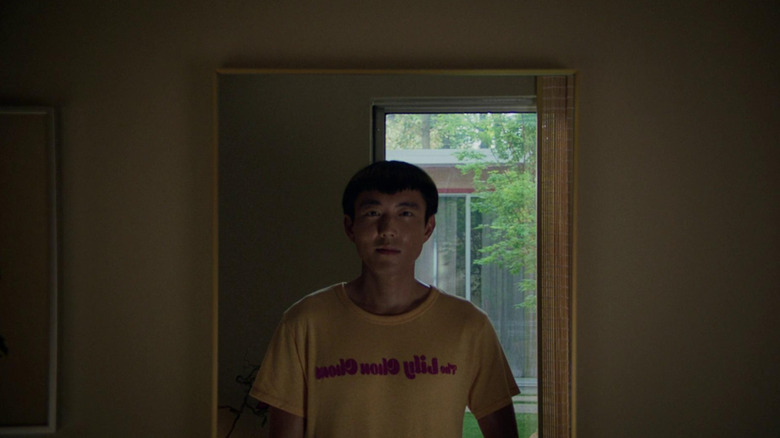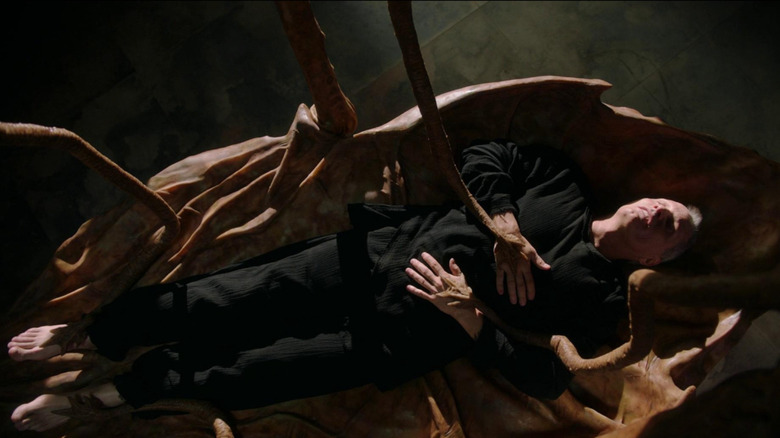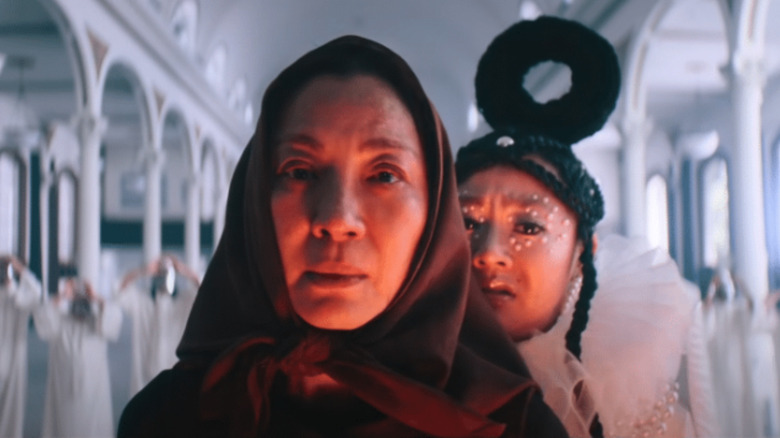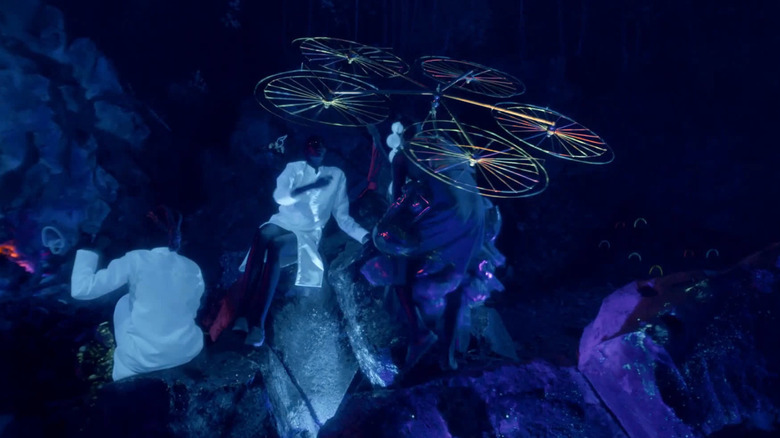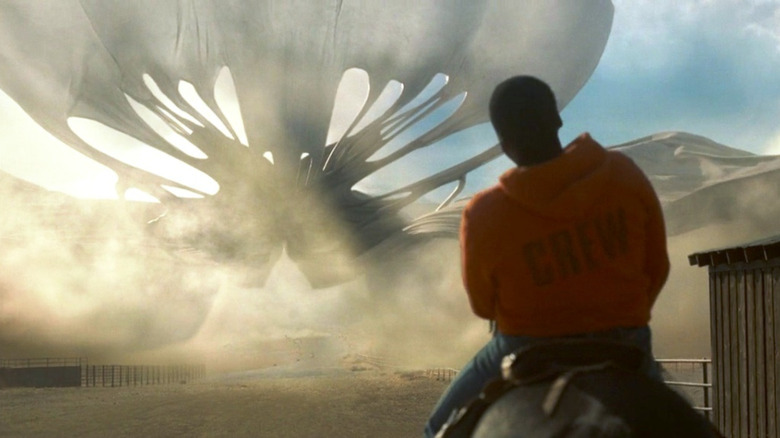The Best Sci-Fi Movies Of 2022, Ranked
Science fiction is one of the most versatile genres not only in film but in the arts in general. It is a genre intrinsically tied with the social, political, and economic strife of any particular time — oftentimes, the cyclical nature of humanity will mean that a sci-fi movie relevant in the 1950s will become relevant in the 2020s. Without science fiction, who knows what the landscape of film and television would be like today?
All of this is to say that 2022 was arguably terrible, although the sci-fi films released this year were pretty damn good. While some movies had their hype campaigns accentuated with festival runs, others seemed to come out of nowhere to delight genre fans and casual viewers alike. From micro-budget films to big Hollywood blockbusters, the genre was rife with sci-fi movies that not only helped diversify the genre but also made us think about it in totally new ways. Reinvention and reinterpretation are at the beating heart of what makes science fiction work, and these ten films all did their part in making us think differently about this dynamic genre.
10. Glorious
Okay, I'm going to be honest here — there will likely be some pushback over this film's inclusion. When I asked my fellow /Film writers their opinion on this pressing matter, they were split on whether it should be considered Lovecraftian sci-fi — after all, Rebekah McKendry's film does deal a lot with the incomprehensibility of the universe, but perhaps its actual science was a bit vague. However, because it's my list and I ultimately make the decisions, I believe it is firmly science fiction inspired by Lovecraft.
Even if it wasn't, why should I forgo a perfectly open opportunity to discuss "Glorious" in all of its, well, glory? It is a break-neck ride that breezes through its 79-minute runtime, enrapturing you in a story that's just as grossly thought-provoking as you might expect from its premise. With compelling performances from Ryan Kwanten and J.K. Simmons anchoring the film, "Glorious" is a movie whose plot is best left as vague as possible. If you thought you knew what you're getting into when I started talking about Lovecraft's demented version of science-fiction, then you better think again.
9. Beyond The Infinite Two Minutes
You may have seen this title hopping around the genre festival circuit last year, but its official release this past January went a bit under the radar. That's a big shame because Junta Yamaguchi's time travel film really is a wildly fun ride. While primarily known for being shot in one take and entirely on an iPhone, it is more than just a technical achievement. It is a genuinely intriguing story of how we need to spend the time we have on this earth to the fullest extent.
As the colorful cast of characters travels through the Kyoto cafe that serves as the film's sole location, the stakes quietly keep stacking up. There is an infectious energy throughout "Beyond The Infinite Two Minutes" that makes the viewer genuinely invested, even if the plot can be a little convoluted at times. Much of this has to do with the highly energetic and eclectic Europe Kikaku theater troupe, whose members play the various people who stumble upon this strange development. Every time they manage to see an additional minute into the future is one that will make you pump your fist in the air and keep you on the edge of your seat.
8. Prey
The "Predator" franchise has always been hit-or-miss in terms of quality. Sure, the first iteration is a legitimately great creature feature as well as a stealthy criticism of 1980s machismo, and 2010's "Predators" made some great expansions on the franchise's shaky lore. However, there are also some real stinkers, like the "Alien vs. Predator" duology and 2018's "The Predator," that have solidified their place in the series.
The series desperately needed some fresh blood injected into it, and thankfully, it got exactly that this year with Dan Trachtenberg's "Prey." At first glance, it seems completely different from any other entry in the franchise — set on the Great Plains in 1719, it follows a young Comanche woman named Naru (Amber Midthunder) as she tries to prove her abilities as a hunter. It initially sounds like a far cry from the military or mercenary team-ups from the franchise's other films, but this new perspective works to reinvigorate the franchise. It didn't need an epic earth battle like the one central to its last film, but rather, "Prey" gave new insight into the infamous Yautja and why they keep being so fascinated with hunting down humans. Plus, the fight scenes between the lovingly-dubbed "Feral Predator" (Dane DiLiegro) and Naru are genuinely sick as hell. Even if you aren't familiar with any of the lore surrounding "Predator," there will be a lot for you to love about "Prey."
7. Slash/Back
Those of us who grew up watching sci-fi know how fun it is to imagine a world where your favorite movies came to life. What if you really did find a benevolent alien in the woods, and you helped it get back to its home planet? What if you had to fight to survive an encounter with a much meaner group of aliens? That's the dilemma that a group of young Inuit teenagers faces in "Slash/Back" when their hamlet becomes ground zero for an alien invasion.
Perhaps the most striking element of Nyla Innuksuk's film is the way the aliens infect their prey. Their bodies become hollow husks as the parasite takes over, leaving a striking image that will be on your mind for days. The special effects, both practical and CG, are also quite impressive, although that probably isn't surprising given Innuksuk's work on virtual reality programs. However, what truly makes the film stand among the best of the year is how it utilizes the alien invasion as a potent metaphor for colonialism. Given how truly rotten some of the most influential sci-fi writers were (looking at you, Lovecraft), the importance of reclaiming and reinventing these tropes in a way that is not only thought-provoking but just flat-out fun can't be understated.
6. Something in the Dirt
Every time I watch a movie by Justin Benson and Aaron Moorhead, I have a ton of questions. What did I just watch? What does it all mean? How in the world did these guys manage to land "Moon Knight" and "Loki" for how unique they are as storytellers? "Something in the Dirt" is certainly no exception to this, and it's a bit of a miracle that something as richly constructed as it was able to be made on a shoestring budget and crew.
There is so much happening in "Something in the Dirt," that it might be overwhelming to try and explain it all in a brief slide. However, what I can say is that it is a fascinating exploration of the influence of conspiracies and isolation on those who are more vulnerable than they might think they are. You know those types of people — the ones who say they would never fall for an obvious scam but do anyway. Instead of being happy or intrigued with each new discovery made by our central characters, there is a distinct sadness looming that only becomes more obvious as the film progresses. However, that very sadness is also integral to experiencing "Something in the Dirt," and you'll be hard-pressed to find a movie like it this year.
5. After Yang
Have you ever wanted to watch a sci-fi movie with robots that also made you cry? Kogonada certainly has, and we're all the better for it, because how else would a movie like "After Yang" enter our lives? The world that the director, who burst onto the scene with 2017's "Columbus," creates here is not that much different from ours — it's got viral dance challenges, uncomfortably smart homes, places that feel crowded yet empty at the same time, and so on. The real difference is that humanoid robots are typical house decorations.
With the layered and heartwrenching presence of Justin H. Min's Yang hovering throughout the film, "After Yang" will likely sit with you for a while after watching it. Kogonada's previous career as a video essayist shines through his directorial efforts in how quietly contemplative each scene not only is, but feels. While certainly not a typical sci-fi movie, it would be extremely remiss of us to not take the time once again to sing the praises of the truly brilliant "After Yang."
4. Crimes of the Future
The return of David Cronenberg had been prophesied for years, but 2022 marked the cult director's true return. And how exactly did he come back to directing after eight years away? By telling a story about the state of modern art, repression, and most importantly, how to alter your body to truly make it your own. What more could you possibly want?
As soon as "Crimes of the Future" begins, you feel uneasy. It might be because of the drab and isolated beach house we are first introduced to, or it could be the image of a young boy eating a plastic bucket. However, it is an uneasiness that you may not have realized you missed because it is quintessentially Cronenberg. This uneasiness is intentional for several reasons — after all, the director has a very distinct filmmaking style, even when he's not necessarily making sci-fi or horror movies. However, the most prominent is that this style is used to make the audience ask why it is associated with the director so much.
Cronenberg knows that he is known for horrific body horror and uncomfortable sex, but he wants to know why he's known for that. That is ultimately what's at the center of "Crimes of the Future." It is both a self-reflection and a broader exploration of artistic legacy told in a way only Cronenberg could tell it.
3. Everything Everywhere All At Once
Come on, you knew that this film was going to make an appearance here. After all, how could it not? It's got everything you could possibly want in a sci-fi thrill ride: multiverses, romance, body swapping, outlandish outfits, and best of all, a nice life-affirming message. Add the incredible performances of Michelle Yeoh and Ke Huy Quan into the mix, along with the direction of the dudes behind "Swiss Army Man," and you've got yourself an instant classic in the sci-fi genre.
Daniels, the directing duo consisting of Daniel Kwan and Daniel Scheinert, already made their mark among the most maximalist directors currently working. As a result, there is a lot being thrown at the audience throughout its 140-minute runtime. There is a lot that shouldn't work about the film, from the multitude of characters played by the same actors to the juggling of intense, sometimes overwhelming imagery. However, Daniels somehow make it work by making the story universal instead of overly specific — "Everything Everywhere All At Once" is ultimately about the power of relentless optimism in even the darkest moments, and that is something worth reiterating in 2022.
2. Neptune Frost
Afrofuturism is an aesthetic that, while being around in an official capacity since 1994, has yet to really break into the global mainstream. While a prevalent inspiration throughout the aesthetic of both "Black Panther" movies, it's still one that is relatively untapped, perhaps in part due to structural racism that allows Hollywood to block these types of films from being made. However, what if you didn't have to rely on the Hollywood system to create a poignant story about love and identity? Saul Williams and Anisia Uzeyman didn't, and after a showstopping debut at last year's Cannes, the entire world got to see their Afrofuturist musical "Neptune Frost" for the first time this summer.
There is obviously a lot to love about the distinct visual style that the film has. Bright colors, unique attire, and the controlled chaos of the environments automatically make the movie memorable. However, it is the way that the story unfolds itself over its runtime, often in non-linear or musically-driven ways, that makes it such a unique experience. "Neptune Frost" is a movie where you are not told its story. Rather, it is one that you feel, and if you go in with the right expectations, it'll course through your veins like the electricity that powers the computers strewn throughout Burundi.
1. Nope
"I will cast abominable filth upon you, Make you vile, And make you a spectacle." These are the words of Nahum 3:6 from the New King James Bible, and they are also the first words of Jordan Peele's sci-fi epic "Nope." It tells you everything you need to know, but also nothing at all. Who, or what is this mysterious entity punishing humanity for spectacle? An angel? A demon? An alien? God itself?
The incomprehensibility of Jean Jacket, the entity that haunts the skies of "Nope," is exactly what makes Peele's third feature the best sci-fi movie of the year. It is haunting, dangerous, and yet, completely shrouded in mystery, a perfect combination of traits for a compelling threat in all mediums of science fiction. The true extent of its danger is teased throughout the film in horrifyingly claustrophobic fashion — don't even try to deny that that scene isn't still buried somewhere in your mind.
Of course, it is not just Jean Jacket as a character that makes "Nope" such a triumph in modern science fiction. It is the visual effects, the fantastic performances by its Daniel Kaluuya-led ensemble, and perhaps most importantly, its epic story about Hollywood worker exploitation and spectacle. Each element of "Nope" comes together perfectly as the story unravels, and thanks to Peele's tight direction, nothing feels out of place. With every detail filled with deep, thought-provoking intention, there truly was no other movie like "Nope" this year.
